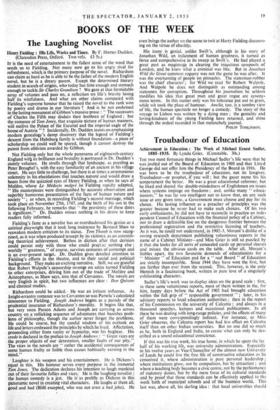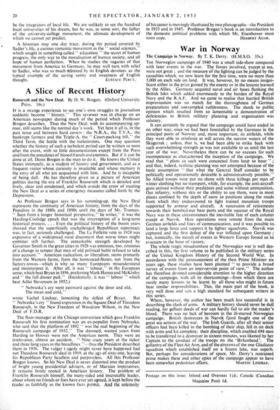Troubadour of Education
THE WO most fortunate things in Michael Sadler's life were that he was jostled out of the Board of Education in 1903 and that Lloyd George did not offer him the Presidency of the Board in 1916. He was born to be the troubadour of education, not its lawgiver. Troubadour—or prophet, if you will ; but the gayer name fits his temperament the better. He was a great educational reformer, but he liked and shared the double-mindedness of Englishmen on issues where systems impinge on freedoms ; and, unlike many " educa- tionists," he was far too intelligent not to know that, on any such issue at any given time, a Government must choose and pay for its choice. His lasting influence as a preacher of principles was the greater because he never had to make such choices. Of his two early enthusiasms, he did not have to reconcile in practice an inde- pendent Council of Education with the financial policy of a Cabinet, nor to draw a defensible line on the dangerous frontier between the professional registration and the restrictive licensing of teachers. As it was, he could not understand, in 1902-3, Morant's dislike of a roving research department publishing voluminous reports in the name of a Cabinet Minister—and Miss Grier is still so puzzled by it that she looks for all sorts of concealed cards up personal sleeves and misses the obvious cards on the table. After all, Morant's foibles apart, the two favourite demands of educationists for a " Minister " of Education and for a " real Board" of Education are strictly incompatible. Since 1944 they have won the first, but are farther than ever from the second. This, however, is the only blemish in a fascinating book, written in pure love of a singularly exhilarating character.
Sadler's life's work was to display ideas on the grand stale: first, in these same voluminous reports, most of them written in the, for him, happy days before the Act of 1902 had brought education within the full grip of "responsible government " ; later, in his advisory reports to local education authorities ; then in the report of his Commission on the university of Calcutta ; and always in a thousand speeches, lectures and occasional publications. In all these he was dealing with long-range policies, and the effects of many of them were correspondingly indirect. For instance, as Miss Grier observes, the Calcutta report has had less effect on Calcutta itself than on other Indian universities. But no one did so much as he, both in England and India, to create what can only be des- cribed as a sound educational conscience.
If this was his true work, his true home, in which he spent the las half of his working life, was university administration. Especially in his twelve years as Vice-Chancellor of the almost new University of Leeds he could live the free life of constructive education as he conceived it, where administration is pure personal leadership ; where institutions grow, not by compulsion, but by attraction ; and where a teaching body becomes a civic centre, not by the performance of statutory duties, 'but by the mere force of its cultural standards and by proof that those standards can be effectively applied to the work both of municipal schools and of the business world. This last was, above all, his darling idea : that local universities should be the integrators of local life. We are unlikely to see the hundred local universities of his dream, but he was, in some sort, the father of .the university-college movement, the ultimate development of which we cannot yet predict.
A historian may one day trace, during the period covered by Sadler's life, a curious romantic movement in the " social sciences," which sought in something called " education "the secret of human progress, the only way to the moralisation of human society, and all hope of human peFfection. When he studies the vagaries of that movement from America to Germany, he may well turn with relief to Sadler, who was so muchirdmired by its English devolees as the typical example of the saving sanity and sweetness of English































 Previous page
Previous page